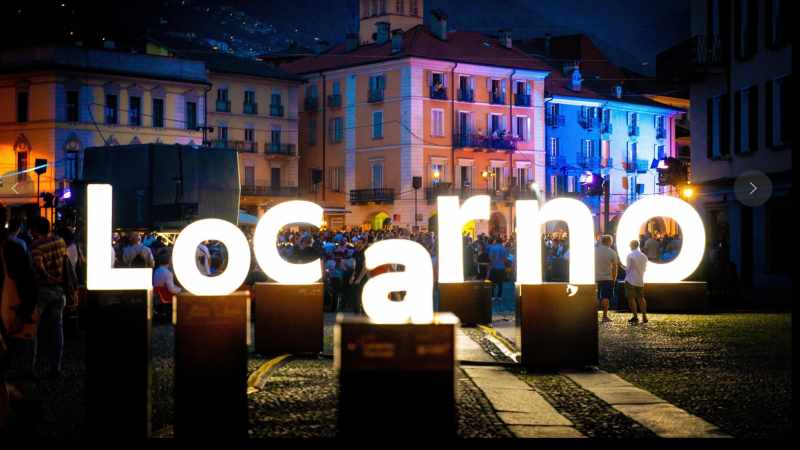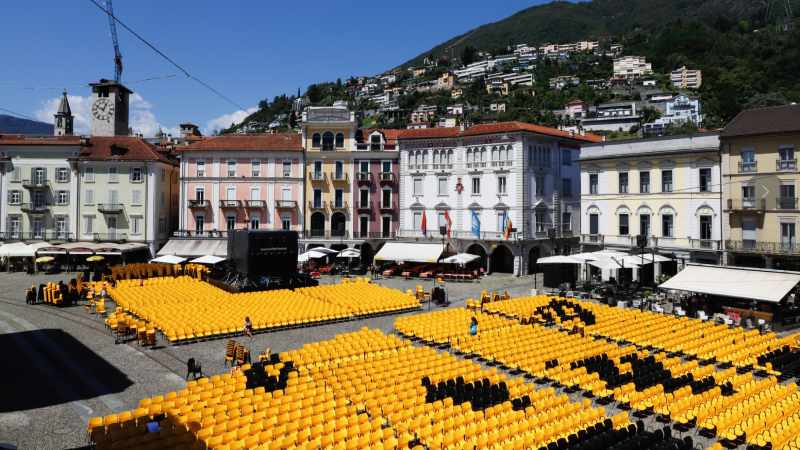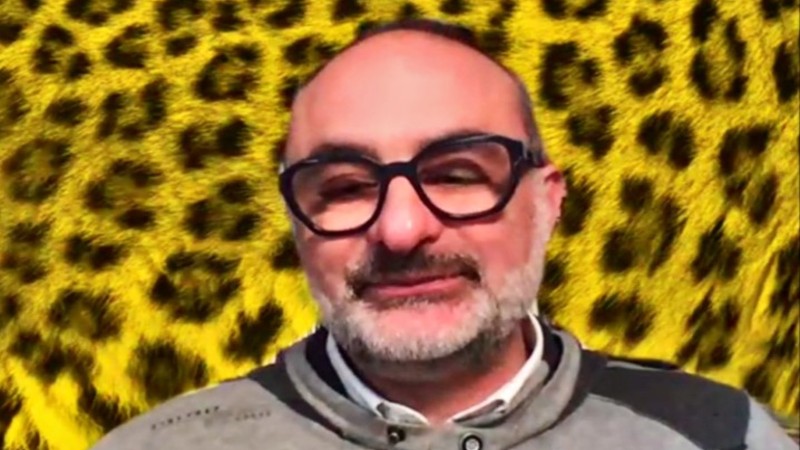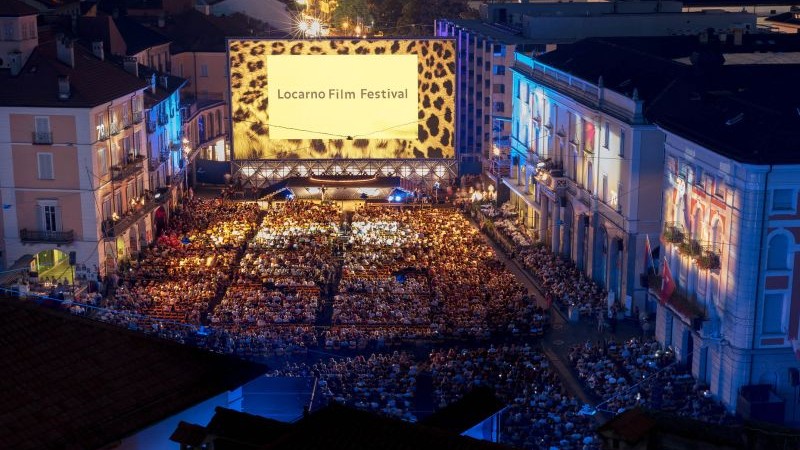Images on his article: Locarno Film Festival/Ti Press
It’s been two years since we first spoke to the new artistic director of the Locarno International Film Festival. Now on its 76th edition, the a-list event boasts the distinction of being the second oldest such film festival in the world, founded in 1946 (second only to Venice, established in 1932). Back in 2021, Giona had just taken over his new role, and the film industry was a very different place. The world was still grappling with a pandemic, and the challenges were somewhat different (with many festivals being held online, or in hybrid format). So we decided to talk to him again and find out what’s happened since.
The 76th edition of the Locarno International Film Festival takes place between August 2th and 12th. DMovies will be live at the event for the fifth consecutive year unearthing the dirtiest gems of world cinema exclusively for you. You can check the full programme by clicking here.
…
.
Victor Fraga – You are now on your third year at the helm of Locarno. Can you please tell us what you’d say you’ve achieved or how the festival has changed ever since we last spoke two years ago?
Giona Nazzaro – Well, you know, I’m not a supporter of the idea that you have to reinvent the wheel. What I try to do is work in service of this entity while giving my individual take on what cinema is and where it’s going. We discussed this a lot with the selection committee. We are trying to create a programme that feels unpredictable, that does not explore the usual roads, and that can point in several directions at once.
VF – When you say unpredictable, what exactly do you mean? Unpredictable endings? Unusual aesthetics? Or something else?
GN – I mean looking at different kinds of films without any preconception. This year we have Quentin Dupieux with surrealistic humour and Lav Diaz. We have Bob Byington with his deadpan humour, and Radu Jude. We have Sofia Exarchou and Annarita Zambrano. So these are very talented and recognised filmmakers, and each has a very specific idea of what cinema is in terms of form, how it stands towards the challenges of the present time, how it should look like aesthetically, formally and politically. I very much like very much the idea that Locarno is a place where you can have a taste of different things.
The fact that we have auteur cinema does not mean that we are looking exclusively in that direction. We’ve opened up to comedies, genre films, and so on. When I talk with producers, I always say: “Stop thinking along the lines of ‘I have the perfect film for Locarno’ because probably it’s not what we are looking for“. I really hope that the Competition is perceived as a place for different sensibilities, and that this conversation can be exciting to professional critics, cinephile as the broader audiences alike.

VF – You say that don’t want to be seen as exclusively auteur-driven. I’ve looked at your programme. I haven’t seen Indiana Jones [which premiered a couple of months ago in Cannes] or even anything remotely as commercial.
GN – The notion of cinema being a commercial or anti-commercial is really alien to me. I don’t think along those lines. And I really work to support auteur cinema. We might have a slightly different take on what auteur cinema is. Lav Diaz and Radu Jude are clearly auteurs. Same with Quentin Dupieux, or the Italian newcomer Simone Bozzelli, which I am convinced will be one of the very strong and fascinating surprises of the line-up. For me, the notion of auteur is a bit more open. Ultimately, everyone who makes the film is the auteur. In this sense, you wouldn’t find a bigger supporter of auteur cinema than Tom Cruise. He controls every aspect of the process, and he does only the things he wants. He tells only the stories that he wants to tell. And he brings his films only to the theatres. He doesn’t go with them to the platforms or streaming, so he does what he does on his own terms. I’m bringing to you a dialectic provocation. But what I’m trying to say is that sometimes we are looking at auteur cinema more as a defined a set of conventions rather than the expression of adventurous sensibilities set out to explore the possibilities of the media
VF – You’re going to show 214 films from 113 countries and that you received in excess of 5500 submissions. Can you tell us a little bit where these submissions are from? Which countries tend to submit more films?
GN – From everywhere in the world: Asia, Eastern Europe, the so-called Global South, whatever that means. So they really come from everywhere.
VF – You have a large programming team. Can you please share your biggest secret? What is the most important thing, which they should be at the forefront of their mind when they are selecting a film for Locarno?
GN – I don’t tell them anything. The idea of having a selection team is exactly to put yourself into uncharted territories. I don’t tell them: “You have to look out for this and this because I like this and that”. Cinema today has so many possibilities. When you are working in a selection committee, you have to ask yourself some hard questions. So we challenge each other all the time. So it’s not a downhill drop. It’s always uphill: climbing, debating, strongly but respectfully disagreeing, and bringing to the table all our abilities, all our experiences, all our critical insights, and trying to listen to each other. And I know this sounds a bit sanctimonious, but it’s a very tough process. It’s a long journey. A very long journey. I didn’t look for people that were thinking along my ideas when I put together the selection team,. I deliberately chose people because I was intrigued by their intellectual generosity, their intellectual audacity. So and I feel privileged to be working with people that challenge each other all the time. Yet again, this sounds like very rosy and stuff, but it’s not. It’s hard.
VF – How large is your select committee? How many people are there?
GN – We’re about six or seven.
VF – What are your performance indicators? How do you gauge success after the Festival was finished?
GN – It’s quite easy. Last year, all the films that we had fared very well with the rest of the festivals and achieved distribution, have been bought, have been acquired. Just a couple of examples: Nightsiren [Tereza Nvotová], which won Best Direction, has been invited to 26 festivals, won a lot of awards, was bought by Netflix and so on. The Tamil film Declaration [Mahesh Narayanan] has also been acquired by Netflix. The film I Have Electric Dreams [Valentina Maurel] has been invited everywhere in the world, and won lots of awards. The same with Safe Place [Juraj Lerotić], Rule 34 [Julia Murat], Stone Turtle [Ming Jin Woo], Matter Out of Place [Nikolaus Geyrhalter], and so on. So. These films have managed to establish a meaningful conversation with different audiences. I always say that the Locarno Film Festival begins when actually the last film has been screened.
VF – Are you telling me that literally every single film that you were screened last year, except perhaps for archive, secured a distribution or a streaming deal?
GN – No, I’m not saying this. I said that a lot of them did that.
VF – There are 14 a-list festivals in the world. Fiapf has now suspended Moscow, as I’m sure you are aware of. Eight of these festivals indeed remain in Europe. Europe is such a hotbed for a-list festivals, isn’t it? What would you say that is it that distinguishes Locarno from from the other seven A-list festivals in the continent?
GN – This is a question that I’ve been asked to answer over and over again. Locarno is a very small city in the southern part of Switzerland. And as the festival takes place, the whole city changes. Colours and shapes. You can really feel the Festival. As in a feast, a celebration. We have real film-aficionados, and we also have a lot of film professionals. In the end of the day, it’s really about how films are embraced, and how the Festival is experienced.
VF – Locarno is indeed a very small place. About 15,000 inhabitants, isn’t it? It’s the smallest city where an a-list festival is held. Even Karlovy Vary is much bigger. I read that you have 13 theatres and that you can have 8,000 people in your Piazza. That’s half of your population, isn’t it? How does such a small place achieve all of that? It’s incredible. Is that just because of the Festival or is there is that a broader film tradition in the city?
GN – It’s really linked to how the Festival, what the festival means to the region of Ticino, and to Switzerland. When we opened the Piazza, half of the city came. This is also very moving because you can really feel the connection that film culture has with the city. You can really feel how people are connected to one of the largest screen screens in the world, and certainly the screen with the largest distance from a projection booth to the screen. This is not to say that the other festivals are not doing a wonderful job. You mentioned Karlovy Vary, and Karel Och is a wonderful friend. I deeply respect his work. I deeply love him. So I’m not saying that what Locarno does is better than what anybody else does, but that’s really not it. But since you are asking me of this unique element, I would say that it’s this idea of people celebrating the joy of being a community that gathers around this campfire that still is cinema

VF – Back to my previous question. There are 13 theatres. That’s a lot for a town with just 15,000 inhabitants. Is that a year-round tradition? What happens to these places when the Festival is not taking place?
GN – We have also a film academy. We are working towards the goal of establishing Locarno as a media city in the near future. We have a local film commission. The Festival has renovated a cinema, the GranRex. Our offices are in a building called the Bala Cinema, the former elementary school of Locarno. Instead of tearing down the building, the municipalities and the authorities rebuilt the whole thing and it became the seat of the Film School, the seat of the Film Commission, and the offices of the Film Festival.
You have to understand that the Festival of Locarno came to be in the south of Switzerland in the Italian-speaking part of the country immediately after WW2. The Venice Film Festival had been established by the regime of the ’20s and the festival in Moscow had been established by the by the [Communist] Party. So Locarno, after WW2, was truly the voice of independent cinema.
VF –You were founded in the same year as Cannes, if I’m not mistaken?
GN – You’re not mistaken. Yes. Locarno was one of the places where Italian neorealism was welcomed in real time. The first film that we that the Festival projected back in 1946 was a rather now obscure film called O Sole Mio by Giacomo Gentilomo, which celebrated the uprising of Naples, the Four Days of Naples. Let me tell you another story: Locarno set the tone and at the height of the Cold War. The Festival welcomed the films from behind the Iron Curtain, prompting a parliamentarian interrogation of how legit it was to show the films of the enemy. Pasolini came to Locarno in order to defend the films of Sergio Citti. Rossellini came too, you know. The Festival of Locarno is ingrained in the fight for progressive ideas.
VF – When I spoke to you two years ago, you told me that if a festival takes place online, it’s not a festival. Do you still have the same opinion about online and hybrid festivals, or has that changed since the pandemic came to and end?
GN– Let’s say me and you disagree about a film online, right?. If things get really bad, I can simply switch off the conversation. But if I meet you in a in a cinema and we are watching the same film, then we need to discuss. I cannot switch you off! For me, going to a festival is being part of a community. And this is also the reason why festivals and becoming stronger and more interesting, despite the struggles in the marketplace, distribution, production, and so on.
VF – Is it fair to say that the Locarno International Film Festival changed the history of Locarno?
GN – Yes. This is something that the President [Marco] Solari has pointed out himself. Two examples. This is where, for the first time, the Italian comic actor Toto was recognised as a true artist, even before the Italians did. The place where Douglas Sirk was first recognised as an auteur was Locarno. He was still alive, living close by in Lugano, a small town nearby. The region of Ticino and Switzerland itself grew thanks to the cultural push that Locarno gave to the whole region and to the whole country. Culture helps you to become something else. Culture widens the horizons of your possibilities.
VF – Culture is transformational, isn’t it?
GN – Absolutely!
VF – But let’s talk about Britain. You’ve got Ken Loach coming, that’s very exciting. I love The Old Oak [which premiered in Cannes two months ago]. Can you please tell us a little bit how that invitation come to be? And what is the significance of Ken Loach and British cinema to Locarno?
GN – Well, first of all, I’m an Anglophile. I’m really in love with the English cinema culture and so on. Ken Loach has been the protagonist of one of the greatest gatherings in the Piazza when he last was here, and he himself was completely overwhelmed by the warmth of the welcome.
VF – Which film was that?
GN – I, Daniel, Blake [in 2016].
VF – Why do you think Ken Loach resonates so much with people in Switzerland?
GN – It’s his humanity. It even resonates with people who might disagree with this ideology. I know of some people that disagree with him, and they are still touched by the warmth of the way he brings his ideas to you. There’s never an authoritarian stance in the way he makes his points. The Old Oak is a film that truly moved me. Somehow the spirit of great Italian neorealism made itself heard in the pictures of this old pub of the remnants of the working class that are under the pressure of ceding to the temptation of becoming unwelcoming, xenophobic. The humanity of these people that are resisting and being resilient on a daily basis, and who simply try to be decent human being, this is something that resonates in an incredible way!
VF – What is your message to filmmakers aspiring to make a difference like Ken Loach, or just want to show their films in Locarno?
GN – There is no message. As Alfred Hitchcock, another British filmmaker, used to say: “If I want to send a message, I can send a postcard”. I never wanted to be a filmmaker because I always was aware that in order to be a filmmaker, you need a certain degree of obsession that I can only have toward certain things in life. And one of them is doing a festival.
The filmmakers that have been in Locarno are truly individual filmmakers. They play by their own rulebook. I would tell a filmmaker: “Don’t listen to people who ask of you to be reasonable, to be realistic, listen to yourself and follow your instincts and the rest will come”!
…
.










